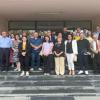Search
Displaying Results 1 - 25 of 138
Experts from UNECE member States and the secretariat will be visiting Bosnia and Herzegovina from 27 March to 6 April 2017 for a field mission in the framework of the third environmental performance review (EPR) of the country. The team will meet governmental officials and representatives of
How can improved environmental performance promote economic growth while ensuring environmental protection and sustainable management of natural resources, supporting countries’ progress in achieving the Sustainable Development Goals (SDGs)?These are among the key objectives of UNECE
Bosnia and Herzegovina and Serbia are in the process of adopting road safety strategies and actions plans that rely on modern tools. In both countries, road safety audit and road safety inspection are recognized by legislation, but in-depth analysis of road crashes is still not part of the
Bosnia and Herzegovina is taking action to improve its road safety situation. This is reflected in the country’s decreasing rate of road traffic fatalities – from 17.7 per 100,000 population in 2013, to 15.7 in 2016 (below the average for middle income countries of around 19 deaths per 100,000
Unemployment rates fell in the overwhelming majority of UNECE member states that reported data in 2016. Compared with 2015, unemployment decreased in 27 out of 32 reporting countries, with 13 countries publishing rates that were over one percentage point lower in 2016. The largest decreases were
In the Drina River Basin, shared mainly by Bosnia and Herzegovina, Montenegro and Serbia, working together across borders and jointly addressing water and energy challenges is a key part of effective climate action and the green transition.
As part of the Sarajevo Energy and
The Mediterranean Region, home to over 510 million people, is an important crossroads for economic, social and cultural exchanges between Europe, Africa, Asia and other continents. The region is rich in biodiversity, but has come under pressure due to the intensive exploitation of mineral resources
Of the 37 UNECE member countries that reported average monthly wages and annual consumer price indices for 2013 and 2014, 32 saw an increase in real wages in 2014. Real wages only decreased in the Netherlands, Portugal, Slovenia, Spain and Ukraine in this period. With the exception of Ukraine,
As early as 1995, the Beijing Platform called for the active involvement of women in decision making; the integration of gender concerns and perspectives in policies and programmes with sustainable development; and the establishment of mechanisms at all levels to undertake a gender impact
How can we create new opportunities for integrated investment projects and to support sustainable development of water and energy resources in the Drina river basin, shared by Montenegro, Bosnia and Herzegovina and Serbia? How can potential trade-offs be limited in favour of harnessing
As Europe advances towards a green and digital economy, the demand for Critical Raw Materials (CRMs) - such as lithium, nickel, rare earth elements and cobalt - is surging. The European Critical Raw Materials Act (CRMA) aims to secure stable and resilient CRM supply chains by setting
Montenegro, The former Yugoslav Republic of Macedonia, Croatia and Serbia plead for strengthening the regional cooperation between neighboring countries on roundwood trade. Knowledge and experience exchange together with realistic figures of roundwood removals are crucial to address the problem
UNECE and the Renewable Energy Policy Network for the 21st Century (REN21), in close cooperation with the International Energy Agency (IEA), have joined forces to develop the UNECE Renewable Energy Status Report, which aims at closing the data and information gap as well as tracking future
Thanks to UNECE and its Environmental Monitoring and Assessment Programme, the global “data revolution” needed to ensure sustainable development and monitor progress in achieving the future sustainable development goals (SDGs) is well under way in the countries of Eastern and South-Eastern Europe
Six months after UNECE ministers from 44 countries renewed their commitments on a number of environmental issues in the region (Batumi, Georgia, 8-10 June 2016), delegates at the 22nd session of the UNECE Committee on Environmental Policy (CEP) discussed progress in the implementation of those
UNECE has been actively engaged in the preparations of the World Conference on Disaster Risk Reduction (Sendai, 14-18 March). At the conference, UNECE Executive Secretary Christian Friis Bach will showcase at various sessions how UNECE work helps member States reduce disasters risks, build
How can we deliver better results on the Sustainable Development Goals (SDGs)? In a joint quest for answers, UNECE member States and key stakeholders will gather in Geneva on 21-22 March 2019 for the Regional Forum on Sustainable Development for the UNECE Region.Closely aligned with the issues
The preliminary results of a new UNECE study on the Drina River Basin in the Western Balkans suggest that broadening and intensifying transboundary water cooperation between Bosnia and Herzegovina, Montenegro and Serbia would have potential benefits, including security benefits. Of particular
Energy and water resources are integrally related and strongly interdependent. Facilitating their integrated management and monitoring can therefore offer an important foundation for sustainable development. The United Nations Framework Classification of Resources (UNFC), developed at UNECE, can
This year’s Regional Forum on Sustainable Development (Geneva, 29-30 March 2023) is taking place against the background of multiple crises: the lingering aftermath of the COVID-19 pandemic; the war in Ukraine; food, energy and cost-of-living crises; economic downturn; and financial vulnerabilities
Promoting sustainable energy and achieving Sustainable Development Goal 7 require commitment from the governments and legislative, institutional, and financial arrangements that facilitate these processes. In a recent study – Establishing a National Energy Efficiency and Renewable Energy Agency in
While underground coal mining in Albania stopped almost wholly (except for two private mines with a very insignificant output) more than 15 years ago, the abandonment of the mines from the 1990s onwards with no proper plans for closure has left a legacy of risks. These include water contamination,
Statistics are all around us. All the more since the COVID-19 pandemic began. Rarely do we see a news story, political debate, press conference or even a social media debate that doesn’t reference statistics. In this environment, the custodians of the figures—the national statistical offices (NSOs
Countries in Eastern and South-East Europe need to develop viable solutions and goals for forest landscape restoration, as well as learn how to tap into the necessary financing. These topics were discussed during the workshop “Forest Landscape Restoration and the Bonn Challenge in Eastern and
The development plans in Bosnia and Herzegovina, Montenegro and Serbia, the countries that share the Drina Basin, need to be assessed for their impact on the ecosystems but also across sectors, in particular energy, agriculture and water management. These plans include some 20 new hydropower








